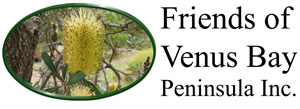
Friends of Venus Bay Peninsula has closed as an incorporated group from November 2020.
This website will remain live until the end of August 2021 and we encourage you to download any information that you wish to keep.
Friends of Venus Bay Peninsula gratefully acknowledge the outstanding work of volunteer and committee member Janet Carey, who instigated the fox control program in 2007 and managed it in partnership with Parks Victoria, South Gippsland Shire Council, DELWP, Coastcare Victoria and the Venus Bay community for many years. Thanks also to our dedicated professional fox trapper Peter Wright. From 2020 the Venus Bay soft jaw fox trapping program will be managed by the South Gippsland Landcare Network.
Since introduction into Australia in the 1850’s, the Red Fox (Vulpes vulpes) has spread across the continent and is responsible for the extinction of many small to medium sized native animals and ground nesting birds. Foxes carry many diseases that infect both wildlife and domestic animals. These include hydatids, distemper, parvovrius, canine hepatitis, heartworm and sarcoptic mange. Sarcoptic mange is transmitted to native wombats that die a slow, painful death from the disease.
With the above in mind the Friends of Venus Bay Peninsula, in partnership with a number of other organisations, initiated a Fox Control Program on the peninsula. In 2007 the program began with an experienced, registered contractor laying soft jaw traps, the most humane method currently available. In ten days 36 foxes were caught, including 17 females.
In March 2008 the program was expanded to include adjoining farmlands and Cape Liptrap Coastal Park, where shooting and baiting are the most effective control methods. The ongoing fox control program now includes a combination of soft jaw trapping, shooting, baiting, cage trapping and a community fox watch to report fox sightings.
At 2020 we estimate that 500 foxes have been humanely removed from Venus Bay Peninsula with the soft jaw trapping program. We hope this will provide Venus Bay’s endangered Hooded Plovers, other ground nesting birds and small native animals a greater chance of survival.

